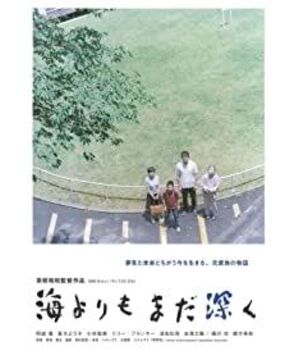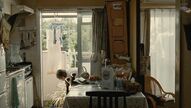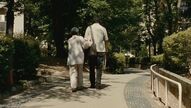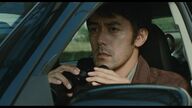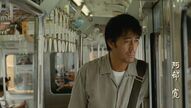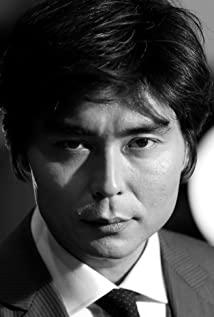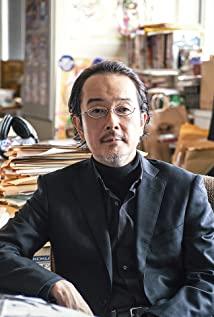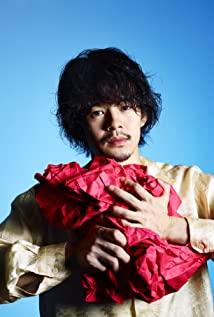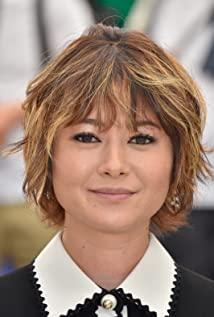In early August, I traveled to Hong Kong alone. Unfortunately, Typhoon Nida was about to make landfall in Hong Kong on the day it arrived in Hong Kong. I thought instead of being trapped in a hotel, it would be better to adjust the itinerary and go to Broadway Center to see the long-awaited new work "Deeper Than the Sea" by Hirokazu Koreeda. It is also very fitting to watch a movie with a typhoon as the background on a typhoon day.
Accompanied by the typhoon warning on the radio, amid the bickering between the old mother and her daughter, the movie opened in the apartment of the residential group, and the familiar figure of Xilin Tree appeared in front of us again. Tree Shirin has become an iconic character in Hirokazu-eda's films over the years. From "Walking Nonstop" and "Miracle" to "Like Father Like Son" and "Haijie Diary", she always plays the role of a funny, humorous and funny old lady, working hard for her children's family and doing all kinds of trivial things every day The housework has a different life wisdom, and can say casually, "Konjac should be cooled slowly and let it sit overnight before it tastes good, just like being a human being." Such a golden sentence. It was Hirokazu Kore-eda that, when his mother died, when he was filming "Never Stop", he thought that the only actress who could carry his thoughts for his deceased mother was Shu Xilin. And it turns out that she, who is not very good-looking, can always perfectly interpret the role of mother. In her, we can always see the shadow of our mother.
In the opening, Hirokazu Kore-eda used the same daily life details as the old mother and daughter chat with each other, so that the audience had inadvertently clearly captured the message of this family. The old father has left, the mother lives alone in a rental house in a residential group, the daughter is married, and the son, who has reached the age of confusion, has achieved nothing.
The failed middle-aged man has also become a fixture in Hirokazu-eda's films. Not to mention that Hiroshi Abe also played a lot in "Walking On" and "Back to My Home", the father who ran away from his lover in "Haijie Diary", and the unrealistic pursuit of music dreams in "Miracle". In "Like Father Like Son", Masaharu Fukuyama has played a lot. Although he is in the middle class, he has failed very much in educating children. And such a middle-aged image is, to a certain extent, the projection of Hiro Koreeda and his own father, the rental house where Hiroko Koreeda once lived in Xuqiu Dandi, and his father and he still did not realize his mother until his mother got older. Desire to move out of rental housing. And the memory of typhoons also stems from his childhood. Before moving into the rental house, Shizhi lived in an old sloping longhouse. Whenever a typhoon came, the roof and windows would creak, and sometimes he even had to run. Taking refuge in a nearby kindergarten, the typhoon still makes him uneasy.
The first half of the film uses a lot of space to show a lot of failures, family divorce, borrowing money everywhere, gambling, sloppy life, blackmailing high school students, and can't even pay alimony, some of which are like buying lottery The plot comes from myself 's father. And such a Luther, when the blackmailed high school student satirized "I will never become an adult like you when I grow up", but responded unwillingly, "You think it's a big mistake to be an ideal adult very easily. Wrong", when he returned home, he wrote "Why is my life like this?" on a post-it note. Slowly, we found that many fathers like him are addicted to gambling and achieve nothing, and many do not want to be middle-aged men who fail like their fathers. In "Like Father Like Son", "You don't need to be like your father" has now become "I don't want to be like my father, but I still follow in my father's footsteps". In front of his son, his ex-wife, his mother, and his family, many still wanted to save face and forced a smile. He tried his best to pretend to be a good father and a good man. He didn't hesitate to lend his son to buy Mizuno shoes, and secretly spy on his ex-wife. The new object, obviously not rich enough to return pocket money to his mother, he is not reconciled or convinced that he has become the same person as his father. He struggled to get involved in his son's life, only to find himself increasingly powerless. Perhaps when people pass forty, five to middle age, their goals in life begin to become clearer and clearer, and they are also in this late autumn stage of life where there is not much to lose. For many, the most precious and rare gain is the birth of their own son.
"I'm always chasing after what I've lost, thinking about dreams that can't be realized, and being trapped by these, how can I be happy every day? If you don't give up something like happiness, you can't get it." In Teresa Teng's "Premonition of Parting", Shu Xilin said this to Hiro Abe. Worse, but no matter how cherished the present life is, the most important thing is to find the joy and happiness that really exists in life. "Having the courage to be someone else's past is a mature man." Lily Frank said the same thing in the movie, right? When the father and son talked about their dreams in the cement pipe, when the family of three looked for the lottery tickets that were blown away by the wind on a typhoon day, did many think the same way? After the typhoon, the family's life seems to have returned to normal. Has this storm brought any changes to their lives? I believe there is. As Hirokazu Kore-eda said in "The Speed of Walking": "I don't like the plot of the protagonist overcoming his weakness, protecting his family and saving the world, but I want to describe a world where there are no heroes, only ordinary people live, and a little dirty world suddenly suddenly It's a beautiful moment."
Unlike other directors, Hirokazu Kore-eda rarely creates big events in the movie to cause big conflicts, making the plot more intense to attract the audience. Especially like "Deeper than the Sea", the emotional exchange between several protagonists in a closed space, once the emotional rhythm is not well grasped, it is likely to become a tearful battle. If the dialogue is not written well enough, the audience may faint. I want to sleep, I can't feel it. There is no confrontation between the two sides, only fragments of life. Even social themes like "Nobody Knows" and "Distance" may become sharp weapons to attack society if they are handed over to other directors. However, for Hirokazu Kore-eda, he prefers to focus on life rather than attacking the system and analyzing human nature. He didn't shoot anything, and he shot everything. Life is so bland, everywhere, and the warmth is mixed with bitterness, which is worth our slow aftertaste.
View more about After the Storm reviews


